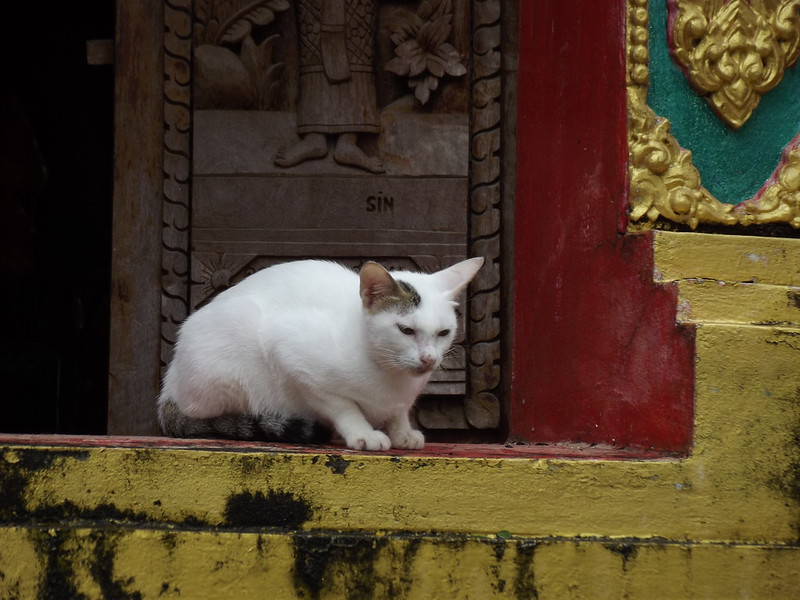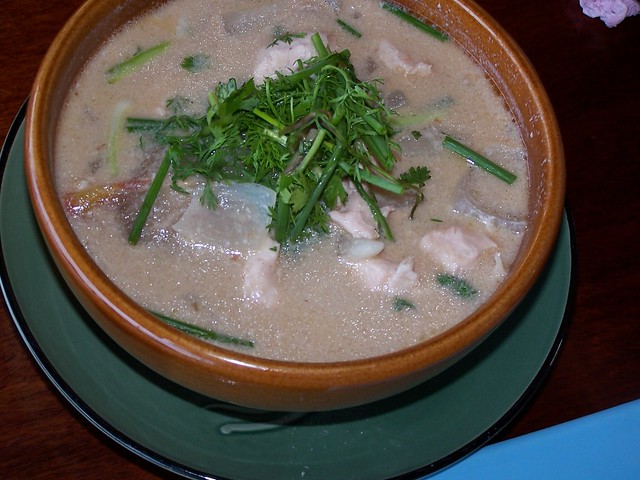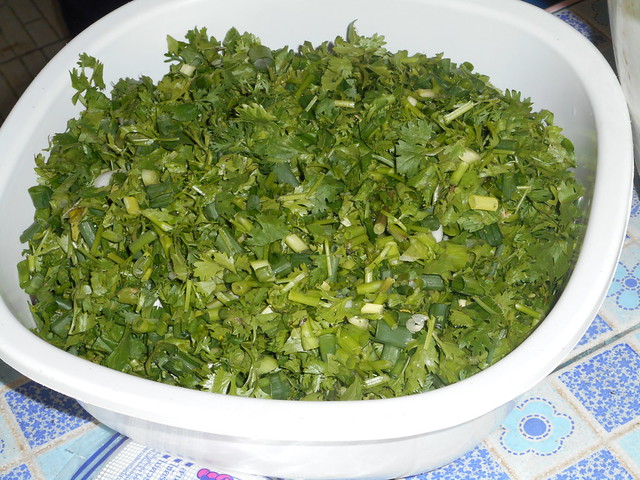 |
| Sinful cat? |
At first I thought it strange to have the word "sin" carved into the door of the stupa. But then I realized that it was totally appropriate, because the word "sin" is a transliteration of the Thai word ศีล, which is a religious commandment.
Unlike Judaism, which has 10 main commandments, Buddhism has 8 "precepts", five of which lay people are expected to keep, the other 3 are supposed to be kept by the monks (as well as the first 5). These commandments are referred to as the "5 Precepts" and "8 Precepts". The 5 Precepts can be summarized:
1. Don't harm living beings.
2. Don't steal.
3. Don't engage in sexual misconduct.
4. Don't lie.
5. Don't get drunk or take drugs.
To a Thai person, sin (ปาป (bap)) is breaking one of these precepts. Other types of wrongdoing go under the category of karma (กรรม (kam)). Karma can be either positive or negative but is usually viewed as negative. In other words, "getting what you deserve" means you are not getting something good.
Keeping the precepts is considered important. It is not uncommon when you enter a village to see a sign that says: "this village keeps the precepts".
In reality, all but the second "sins" are fairly common in Thailand (though certainly not exclusive to this country).
The first of these precepts refers not just to killing people (as in the 6th commandment of the Bible), but to all creatures. You would think, then, that this would be a country of vegetarians, but it is far from the case. People justify eating meat by the fact that they don't typically do the killing, they just eat the meat from animals someone else killed. The fact that the animals would not be killed if there were no market for the meat does not seem to be relevant. Interestingly, this precept does affect some kinds of pest control. You seldom see a typical rat trap or mouse trap. What you usually find are glue traps. This is because these glue traps don't directly kill the rodents, so the person who set out the trap can honestly say, "I didn't kill the rat." That the rat may have starved to death because of the glue trap, or died when the trap was buried in the trash heap is not their concern. (Others would say that glue traps are actually a less humane way of doing things.) Keeping this precept also means no killing mosquitoes. So if a mosquito is in the process of sucking your blood, don't swat it.
I like the fact that the second precept is better observed. It's nice that I don't normally have to worry if I forget to lock the doors of the house or car. This experience is certainly a lot different than other places I have lived. Theft of intellectual property, on the other hand, is rampant. For example, even if you want to buy a legitimate DVD, sometimes it can be difficult to find one. Even ones that seem legit may turn out not to be.
As for the third precept, just after we moved to Thailand in 2011, someone did a poll in Thailand and found that just over 50% of married men AND women admitted being unfaithful to their spouses. I was even asked by a monk once, while Ingrid was present, if I had a Thai wife, as if the fact that I already had a foreign wife was irrelevant to the question. And while there are laws prohibiting prostitution, it is still fairly common. On several occasions, when we have told people we have been not been able to have children, we have been asked, "have you tried other partners?"
There are two words for "rape" in Thai. Khomkheun (ข่มขืน) refers to rape by a stranger, and is definitely considered a sin and a crime. However, blam (ปล้ำ) refers to things like date rape, which is normalized on TV and is viewed of as acceptable—or at least as something that women should be expected to endure. A young Christian woman we know was counseled by her friends that if her boyfriend wanted to have sex with her, she should, because he needs it. (I guess the needs of the women don't count for much.)
Regarding the fourth precept, truthfulness takes a backseat to saving face and desire to please. The most common form of lying, though it is not really viewed as lying, is to say "yes" when you don't don't mean it. This is done because you don't want to be seen as disagreeable and a desire to make the person who asks the question feel good. I even wonder sometimes if I should answer truthfully, as my Western culture dictates, or just say yes, which is not necessarily understood as a yes. Or would I be misunderstood because they expect me to answer as a foreigner?
One wonders why in Thailand liquor and other alcoholic beverages are even sold, with the 5th precept being what it is. Yet all kinds of alcoholic beverages are readily available, though they do ban sales in stores (not restaurants and bars) on certain Buddhist holidays. A common late afternoon and evening activity is the drinking circle, kind of the equivalent of happy hour in my home culture. This past week there was a festival associated with the end of Buddhist Lent. Alcohol was served at most of the events, even though his was a Buddhist celebration. We are saddened when we hear, "I wish my father would stop drinking" or "I wish my husband would stop drinking."
I write all this not to say that the Thai people are bad people. Indeed, they are normal people. They struggle with the same things people all over the world struggle with, regardless of what their religion or nationality is. Thai people aren't the only ones to try to find justification for their actions so that they aren't "sinful," we are very good at that in my home culture as well. It is also not a new kind of behavior. Two thousand years ago, Jesus talked about those who "strain out a gnat and swallow a camel." (Matthew 23:24)
We can also be pretty selective about which commandments or precepts we wish to follow—not just as individuals but as cultures or sub-cultures. We have what I call socially acceptable sins. The problem with socially acceptable sins is that they change with time, so someone who may have once been considered a good person is now a bad person, without the person having changed.
We also like to rate sins and crimes so that we come out on the better side. He ran a red light (bad boy); I drove over the speed limit (socially acceptable). She cheated on her taxes (everybody does it—and it's only the government who taxes too much anyway); he spanked his child (what an awful parent).
The Bible speaks a lot about the struggle of mankind to observe rules.
Not a single person on earth is always good and never sins.
Ecclesiastes 7:20 (NLT)
All of us, like sheep, have strayed away. We have left God’s paths to follow our own. Yet the Lord laid on him the sins of us all.
Isaiah 53:6 (NLT)
For everyone has sinned; we all fall short of God’s glorious standard.
Romans 3:23 (NLT)
If we claim we have not sinned, we are calling God a liar and showing that his word has no place in our hearts.
1 John 1:10 (NLT)
At first, reading all these verses can be a bit depressing. If we are all sinners, what hope is there for us?
Which is why Jesus came to bring us incredibly good news!
First, the sins we've committed can be forgiven.
But if we confess our sins to him (Jesus), he is faithful and just to forgive us our sins and to cleanse us from all wickedness.
1 John 1:9 (NLT)
Second, the Holy Spirit is given to those who believe in Jesus to help them not to sin.
Those who have been born into God’s family do not make a practice of sinning, because God’s life is in them. So they can’t keep on sinning, because they are children of God.
1 John 3:9 (NLT)
And this is his commandment: We must believe in the name of his Son, Jesus Christ, and love one another, just as he commanded us. Those who obey God’s commandments remain in fellowship with him, and he with them. And we know he lives in us because the Spirit he gave us lives in us.
1 John 3:23, 24 (NLT)
But the Holy Spirit produces this kind of fruit in our lives: love, joy, peace, patience, kindness, goodness, faithfulness, gentleness, and self-control. There is no law against these things!
Galatians 5:22, 23 (NLT)
Thank you, God, for sending Jesus to die for us that our sins might be forgiven. Thank you for sending your Holy Spirit to all those who believe in Jesus to help make it possible for us not to sin.



